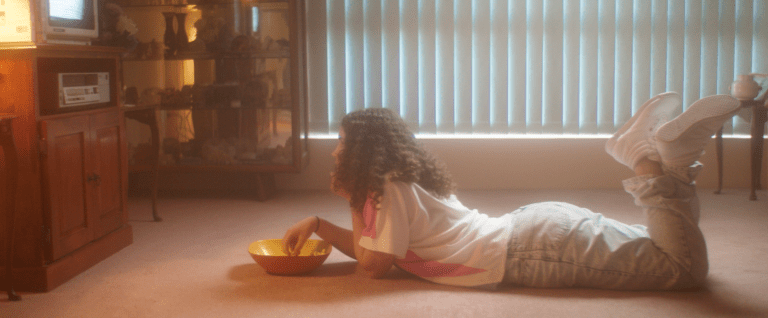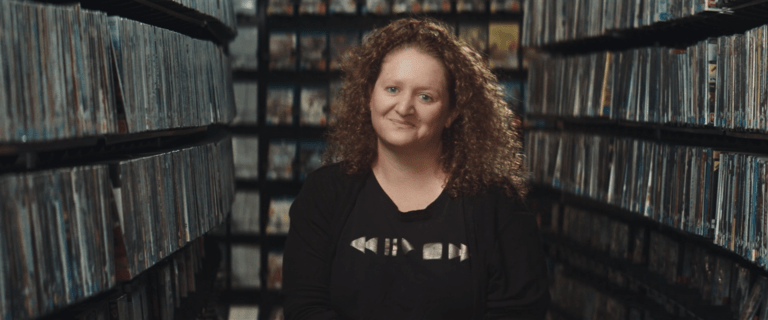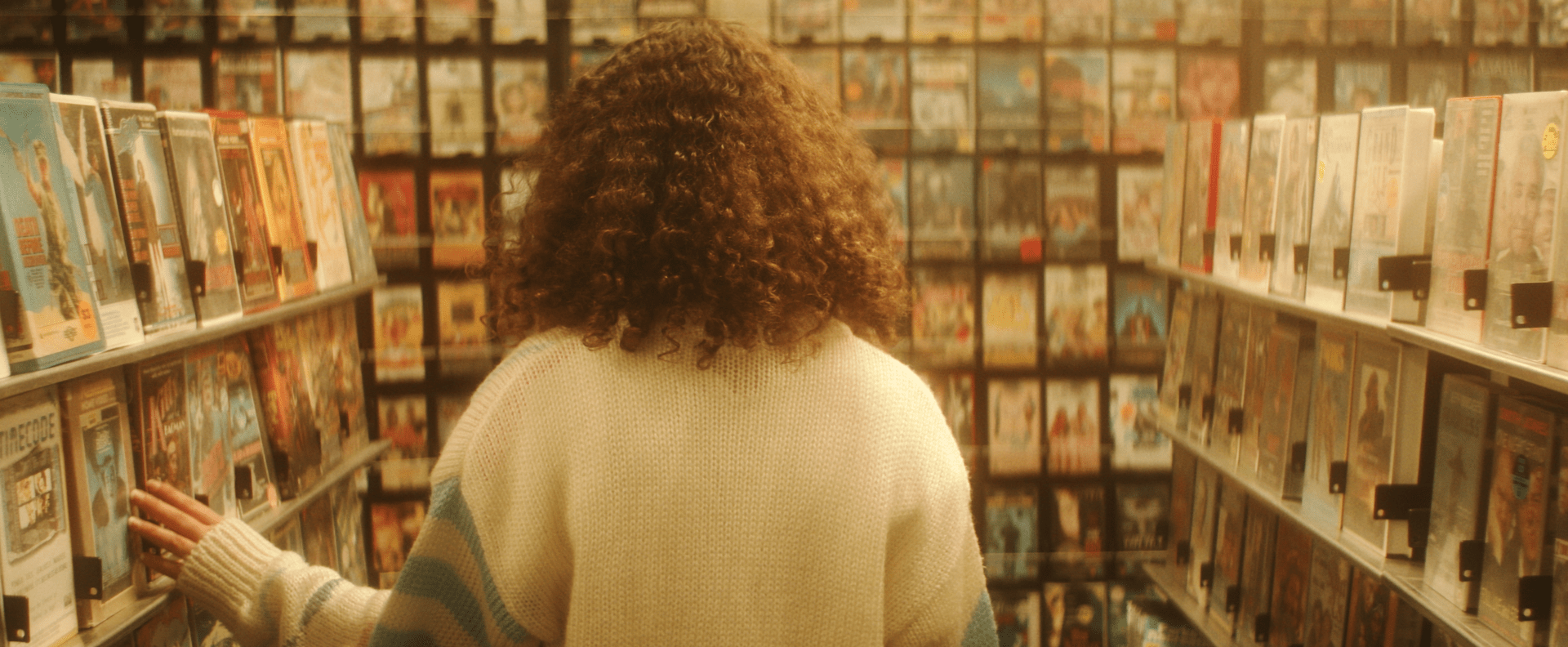Growing up, I used to peruse the aisles of the Canning Bridge Civic Video – a mammoth store with an obnoxious, yet comforting, yellow banner, replete with Groucho Marx and cigar, now turned into an equally mammoth Nandos chicken store – picking up VHS tapes of films that either sounded like my thing, or that I needed to watch. A journey through some truly dog-centric films somehow ended up with an accidental rental of Dogs in Space, which then caused a spiral of fascination into obscure and untouched Australian films.
Each row was another Alice in Wonderland-esque tunnel to tumble down. One genre blended into another, with romance slipping into drama slipping into comedy. Critters sat within eyeshot of My Life as a Dog (another hopeful dog-flick rental that was anything but that). The Butcher Boy leered close to Delicatessen, both promising devilish delights. The ever-expressive cover of You Can’t Stop the Music beamed with promise near the equally enticing Muriel’s Wedding. With a warm $10 note in your hands, you could walk out with a stack of movies to whittle your weekend away with.
Closing my eyes, I’m immediately whisked away to video stores of my life. The ma-and-pa joints around Australia particularly live in my memories with immense vibrancy. The video store down in Dunsborough, where my Grandmother rented me Breaker Morant when I was seven, planting the seeds for my love of Australian films. The little store adjacent to the main supermarket in The Gap, Queensland, where I used to laugh at the cover for the animated film Where Did You Come From? Or the small video store in Mount Pleasant, the only one that I can recall that had a curtained off R-rated section, where I became good friends with the owner, who eagerly allowed me to watch The Texas Chainsaw Massacre, Braindead, and Pulp Fiction, with no issues over the fact I was only 13.
To visit the video store was a sacred thing. The promise of possibility was almost as exciting and invigorating as the films themselves. Maybe it was the ever-knowing clerk, eager to prove that they could out-obscure the encyclopaedic Quentin Tarantino with their film knowledge, or the array of lollies and sweets that seemed to only exist in the world of video stores (imagine my ten year old shock when I discovered Toffee Apple bars in a deli, away from VHS tapes), or the dusty and dry smell of a room full of plastic and well-worn carpet, but there was – is – something truly spiritual about the video store.
Names stick, and they carry weight, so when the VHS tapes were manoeuvred into oblivion to make way for DVD’s, the name ‘video store’ stuck. Stores may have been smaller, and there were certainly less of them as time weathered on, but the video store remained an icon.
Weekends would consist of a parent bundling pyjama-adorned kids into the car, driving on down to the local Video Ezy, order a pizza, pick a movie for the little ones, and one for later on when they’d been shuffled off to bed, and then they’d be returned a day or two later. It was an experience, a familial one, a communal one, one that became a foundational aspect of society, helping form a generation that applauded and adored the film watching experience.
The tangibility of going to the video store helped elevate the experience of watching a movie. You had to leave your house. You had to talk to someone, usually about your selection. You had to consider what you were going to take home with you, because once it was home, it was all that you were going to have. There was a finality to renting a movie. You needed to be sure of your selection, and that surety was a mighty comfort.
Pointing my gaze towards the now, the world where in the midst of a pandemic, another of Perth’s ever-dwindling video stores closed. In a vulturous fashion, and in spite of social distancing orders, swathes of people descended upon Fanbase Collectibles in White Gum Valley (previously Video Ezy Spearwood) and tore apart the well-loved ex-rentals, leaving plenty of desolate titles that have long yearned for the warmth of a DVD tray. I can’t lie, I was one of those opportunistic scavengers, making the pilgrimage to the age-old sanctuary of narrative possibilities that was the video store. For half of nothing, I managed to gather a small library of titles that filled holes in my own personal library.
This routine scavenge has become the norm throughout the years, albeit less frequently, with filmhounds scouring the suburbs for closing stores to pillage. Once upon a time, when the video store industry thrived, I used to set aside weekends to drive through the suburbs, picking up ex-rental copies for a pittance, building a collection of forgotten silver and neglected gems. Initially, the neon ‘weekly rental’ stickers annoyed me, but now I look upon their stubborn presence with heart-warming nostalgia.
Opening up the DVD case would be akin to finding the serial number of a car. Sitting around the ring of the hole would be a sticker, a pet tag, telling the once-renter, now-owner, where this well-worn disc once belonged. Joondanna, Girrawheen, Armadale, Fremantle, Pinjarra, Busselton. I’ve been everywhere, man.

Then, titans of the video store industry collapsed. Perth’s Planet Video disappeared, and with it a slice of film culture died with it, both being replaced by a chain Mexican store. Andrew Leavold’s iconic Trash Video in Brisbane existed as a genre eutopia, one where interstate folks like myself yearned for its continued existence. In Victoria, the iconic Video Busters gradually fell, one after another.
The extinction of video stores around the world has become a fabled tale, writ large on the news. In 2019, two Blockbuster video stores in the world – one in Morley, Western Australia, the other in Bend, Oregon – competed for the title of being the last remaining Blockbuster. It was a bizarre affair, one that I played a miniscule role in, being interviewed by Today Tonight about the death of video stores. Adding to the otherworldliness was the experience of gathering armfuls of DVD’s from the dying Morley store, all the while Perthonality Ozzy Man did a livestream to his followers of the selections on offer, talking about the titles on offer, his smile-inducing larrikinism celebrating the notion of video stores and the community that comes out of the wood work around them.
This groundwork is set to give the impression of what gems of joy are contained in Louise Bertoncini’s short film The Throwback. This joyous short film was funded through the City of Vincent Film Project, an initiative run in partnership with Revelation Film Festival where an emerging filmmaker is given $5,000 to make a short film about a story within the City of Vincent. The notion of community is strong with these two bodies, one political, one creative, coming together to showcase the diverse stories that can be explored within a municipal district.
The Film Project has explored stories about local choirs, animal carers, architecture, sports, and asylum seekers, but it’s with The Throwback that the video store experience is embraced completely. Here, Louise celebrates one of the last remaining video stores in Perth: Network Video, Mt Hawthorn.
The review I would have written for The Throwback in 2019 is completely different than the review I’m writing now. Then, Network Video still existed. It was struggling, with increasing rent and reduced traffic, causing a stagger to closing. If I’d seen this brilliant film at the 2019 Revelation Film Festival, or at Cinefest Oz, maybe I’d have written a review about the fighting spirit of Mel, the ever-smiling owner of the store. Maybe I’d have tried to push for more people to head along to Network Video and keep a remaining video store icon alive.
But, I didn’t see it at those festivals. No, I saw it at the WA Made Film Festival. I wrote about the experience of being within that festival at a time where isolation protocols were being put in place here.
I then rewatched The Throwback at home, and the realisation of what has been lost washed over me.
I want to be clear, this is not a film searching to pull your heartstrings. Quite the opposite in fact. The Throwback seeks to celebrate the small business, the battler, the person coming together to unite a community and be a central point of connection. Mel, with the support of her kids and long-term employees, kept Network Video alive after taking over the business from previous owners. Much to the chagrin of her accountant (also her husband), amongst an ever-increasing debt, the business rolled on.

It would be simple to just show a video store on its last legs, another business dying in an ever-changing world, but Louise’s direction wants to show why places like Network Video were important and valuable. Shots of the shelves, lined with everything from classic films to Jurassic Park knock offs, are interspersed between to-the-camera interviews with staff and customers.
It’s here that the monument that is the video store is celebrated.
It seems redundant to say this, given it’s such an obvious statement, but it’s easy to forget that businesses exist to serve customers. They exist with the purpose to deliver a service or sell goods to people, and while it should be business 101 to treat your customers with respect and adoration, to help prosper your bottom line by being a good person (what a thought!), in this ultimately digital age, it’s easy to forget what customer service is all about.
But not Mel.
Mel’s entire ethos is positivity and looking out for everyone else. I should add, I know Mel personally, and am thankful to be able to call her a friend, but as anyone who visited Network Video, or watches The Throwback, will know, Mel is a friend to all. Her warm personality and generous spirit made walking through the doors at Network Video like walking through your own front door.
Her positivity is mirrored in the customer interviews that make up the bulk of the short. There’s the energetic Bevan who visits the local pizza store, skipping streaming to watch a DVD instead. Or Maree, a long term customer who travels to the shop on her bike with her dog to pick up a movie or two suggested by the knowledgeable staff. Or even Marcus, the work experience kid who loves Let the Right One In and lives to be immersed in films.
Within the film, they feel larger than life, almost exaggerated, but these are the real people – amongst the many others – who see value and importance in visiting and using their local video store. They recognise the need for that personable experience that a vending machine can’t provide. For these customers, the films are only a fraction of the rental experience.
The Throwback shows why someone like Mel would want to buy into a dying industry like the video store one. As she mentions, there’s something in carrying on the torch of being a place to visit with your family, of being a central point that celebrates film. Sunsoaked scenes, reimagining Mel’s youth, watching video tapes on an old CRT TV, help show why she would want to try and be the ‘last video store standing’.
There’s a universality to The Throwback. This is a familiar story to anyone around the world, which is likely why it won the Grand Prize at the Canada Shorts International Film Festival. Also, the fact it’s a charmer of a film helps too. But it comes back to the people, the customers, the employees, those who love films and entertainment.
Maybe some of us are too young to have experienced the hey-day of video store culture, living in a world where films are available at our fingertips, relying solely on an algorithm to suggest possible titles of interest, but the one thing for sure is that we’ve all got memories of watching movies. The Throwback reminds the long-neglected notion that it’s not just the movie watching that creates the memory in our mind, but the journey to the movie as well.
It’s a film like The Throwback that gives me some hope that in the future, video stores might make a comeback. Not on the wide scale they once existed at, with each suburb having their own store, but at least as a niche experience here and there. Curational, caring, and conversational places where film lovers can experience the act of discussing and talking about films with like minded folks.
In the midst of a world changing pandemic (one can hope that after all this pain, we don't return to 'normal', instead changing for the better), it’s hard to imagine that kind of experience. It feels so long ago, so distant and foreign, yet, the memories live large in our minds. But, it’s one that we need to hold tight and cherish.
A lot of these communal experiences feel desperately foreign now. Watching a movie together in a cinema with the electricity of everyone witnessing that jaw dropping climactic moment at once, experiencing a live band with a heaving crowd, eating out at a busy restaurant full of competing conversations, or cheering on a local sports team from the sidelines; these are all what makes us who we are: a community of people with shared interests and experiences.
It's not until these experiences are threatened that we see the need for them the most. The gradual disintegration over time of the video store experience is like a frog in the water. We're told it's getting hotter, and to do something about that heat, but when it's boiling, and all the stores are gone, we can't help but look at what's been lost and wish it were different. Now we sit in our homes, scrolling endlessly through Netflix titles, struggling to decide what to watch, so instead we just opt for the endless stream of thumbnails, making up ninety minutes of indecision and inaction.
Louise encompasses that loss with a warm hug of hope and optimism. This is a wonderful short film, brilliantly positive and cheerfully delightful. It's clear that it's directed by someone who cares deeply for her community, and wants to see those who live within it thrive and live out their dreams. The energy and vibrancy that she fills every frame with makes me mark her down as someone I’ll be keeping an eye on in the future.
And heading into the ‘other side’ - whatever that may be - we need more people working to mend and build their communities, to strengthen and reinforce the unity we had once before. Film festivals like Revelation Film Festival, or council like the City of Vincent, or filmmakers like Louise, or most importantly, small business owners like Mel, all of them work together to support, foster, and build a community that supports one another. While the future of Network Video Mt Hawthorn was not to be, the heart and passion of all involved lives on strong.
We’re best when we lift each other up, and if we don’t want to see more cultural tenets disappear, then we’ll need to do that even stronger and more in the future.
Director: Louise Bertoncini
Producer: Jenny Crabb
Cinematographer: Tim Fitzgerald
https://www.facebook.com/445966652621376/videos/406839269940053

